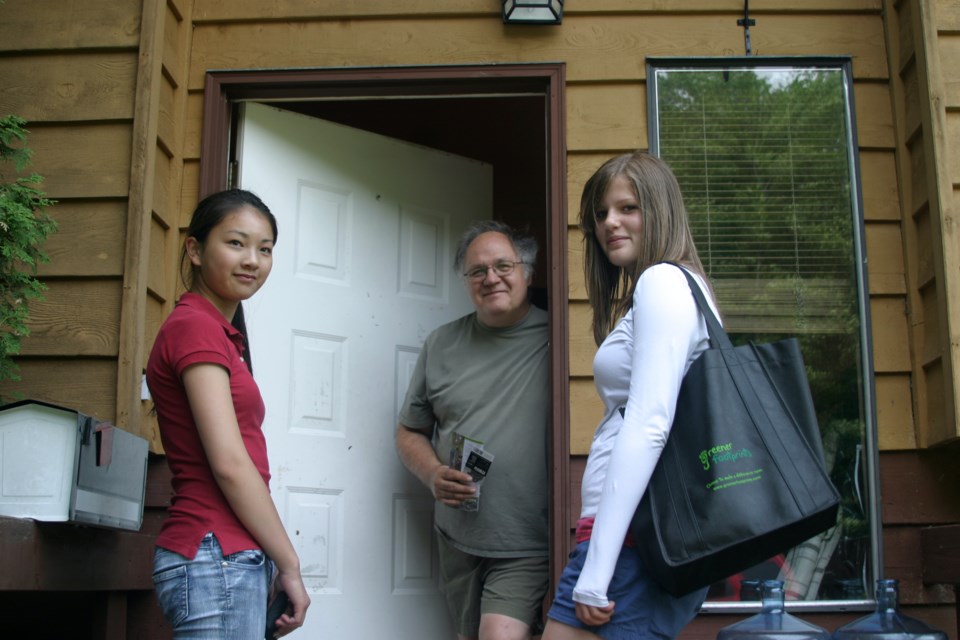It is proof that patience is a virtue.
Activist Tracey Saxby has been lighting figurative fires all over the province for years in an attempt to ban single-use plastic bags in multiple communities, including Squamish, amassing support along the way.
When the Australian began campaigning, she dutifully went from door to door to appeal to entrepreneurs where they’re most vulnerable: the pocketbook.
“It’s considered a service, but it can cost small businesses a lot of money. And it’s not needed. The way I framed it was that it was a way for local businesses to reduce their expenses and business costs while doing something good,” she said.
To understand Saxby, and her impassioned advocacy work, you have to travel back 38 years to her time living in a small sugar cane farming town called Bundaberg.
As a sunny barefoot youngster, she would volunteer to pick up garbage in Coonarr Beach along with the rest of her family.
The destination was surrounded by a national park that gave them privacy and seclusion.
She also grew up snorkelling, which is how she first encountered the clownfish made famous in Pixar’s Finding Nemo. She loved turning to see it frolic through its richly colourful underwater landscape.
She’d never seen the impact of climate change up close.
While family camping on Lady Elliott Island one summer, she was devastated to learn that Nemo’s home had been completely bleached.
“They still had clown fish, but the immediate impact of witnessing the change and devastation was what inspired me to become a marine scientist. I studied coral bleaching in Australia in 2001 and wrote my thesis on the impacts of bleaching,” she said.
So how does this relate to plastic bags? Well, Saxby has been devoted to this particular project for almost two decades.
Following that first campaign started in 2007 in Rossland, she repeated it in Squamish.
It has been a marathon, not a sprint involving many supporters who’ve rallied behind her.
For the Â鶹Éç¹ú²úcampaign, there were numerous presentations to schools, businesses, and community groups, and over 200 volunteers helped to deliver a reusable bag to every home in town — more than 7,000 homes at the time.
It was a , as advocates learned in 2007 that local governments didn’t have the authority to do so.
They continued up the ladder until they convinced the B.C. government to change the law in 2019, and then, finally, they shoved the initiative past the finish line when the federal government announced in June it would ban six types of single-use plastics by the end of 2023.
Squamish's bylaw was adopted on Feb. 15, 2022, and will be enforced beginning Aug. 15.
The ban will impact single-use plastic checkout bags, plastic utensils, polystyrene foam takeout containers, plastic stir sticks and plastic straws (barring accessibility straws).
Saxby is doing all this for love of nature, not for accolades.
“Growing up, I spent a lot of time outside, and just from being outside you develop a love of place, a sense for your surroundings. There’s stewardship and caring for all the places you love, and that’s what drives a lot of what I do,” she said.
“Loving or appreciating the natural environment around us can be as simple as appreciating birdsong or being near the ocean. If we value these ecosystems, then we need to do everything we can to protect them.”
She thinks back to a scene in Mad Men when the titular 1950s family goes for a picnic, and, when they’re finished, carelessly toss all their garbage on the grass. To her, this is an example of how human culture can change and evolve, whether that means being conscientious about your waste or how you carry your grocery bags to the car. Smoking is another example.
These days, her focus is on fighting the proposed Woodfibre LNG facility slated for the shores of Howe Sound. She co-founded My Sea to Sky eight years ago to invite others to join that fight.
She believes it could be devastating for the community — reminiscent of the coral bleaching event which destroyed Nemo’s home all those years ago.
She doesn’t want to see the same thing happen twice.
“If we’re worried about climate change, we need to stop burning fossil fuels. We need to build no new fossil fuel infrastructure and we need to phase out the infrastructure we have. This has been my focus for the last eight years, which is why we founded My Sea to Sky, a people-powered organization with hundreds of volunteers working to stop Woodfibre LNG."
But she’s also taking time to congratulate herself and others for the plastic bag ban.
“It took a long time, and the efforts of many everyday Canadians with unrelenting advocacy from dozens of organizations and local governments calling to ban single-use plastics, but 15 years later, we finally did it. We finally banned single-use plastics. Why I am so proud to have played my small role in this is … it shows how everyday people can make a difference.”
**Please note, updates and corrections were made to this story after it was first posted, including a change to say that Saxby grew up in a sugar cane farming community, not on a sugar cane farm as first stated. Also, My Sea to Sky volunteers did not help advocate for the plastic bag ban. Instead, it was volunteers with a previous not-for-profit organization, Greener Footprints.




